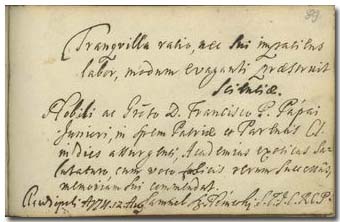
Tranquilla ratio, nec sui impatiens labor,
modum evaganti praestruit scientiae.
Nobili ac G[ene]roso D. Francisco P. Pápai
Juniori, in spem Patriae ex Parentis Cl[aribus] in dies
assurgenti, Academias exoticas salutaturo, cum voto foelicis rerum
successûs, memoriam sui commendat.
Claudiopoli A. 1711. 12 Aug.
Samuel Sz. Némethi. S. T. I. C. R. C. P.
|
|
Only a calm mind and an effort patient to itself is able to create
an extensive knowledge.
I recommend myself in the memory of the noble
and eminent young Ferenc Pápai Páriz, born from noble parents for
the hope of the fatherland, who sets out for visiting foreign
academies; and I wish him fortunate success.
In Kolozsvár, on August 12, 1711.
Sámuel
Szatmárnémethi
Professor of Theology in the Reformed College of Kolozsvár
|
p. 89.
Kolozsvár/Cluj, August 12, 1711
Szatmárnémethi, Sámuel
(1658-1717), Transylvanian Reformed
theologian
Sámuel Szatmárnémethi was born on August 10, 1658 in Szatmárnémeti
(Satu Mare). His elder brother was the Reformed dean Mihály
(1638-1689). He learned first in his native town, then from 1675
in the College of Kolozsvár, and from 1679 in Debrecen. In 1680 he
went to Utrecht and Leiden, and from there in 1682 to Franeker.
From the autumn of 1683 he taught Biblical languages and
philosophy in Kolozsvár. From 1693 he was the tutor of Prince
Mihály II. Apafi of Transylvania, and in the autumn of 1695 he
became professor of theology in the College of Kolozsvár. He died
on December 17, 1717 in Kolozsvár. He left his library to the
college together with an important donation, and he also left
significant funds for the Reformed Colleges of Gyulafehérvár (Alba
Iulia), Nagyenyed (Aiud) and Marosvásárhely (Târgu Mureş).
He was an authoritative Reformed theologian of his period, a
leading Hungarian representative of the Cartesian Cocceian school,
a fertile author of theological works. The foreword to a book of
his published in Utrecht in 1714 was written by Herman Alexander
Röell, then professor of the University of
Utrecht. It is a painful fact that he was one of those that caused
with his arrogance and envy the financial and intellectual
collapse of the internationally renowned printer Miklós
Misztótfalusi Kis, who had returned home in 1690 from Amsterdam.
He published several laudatory poems, funeral sermons, biblical
commentaries, amongst other: Disputatio theologica … causam Sp. S. Vitricem
demonstrans … sub praesidio … Christophori Wittichii …
Leiden, 1681. – Exercitii philosophico-metaphysici de perenni
duratione mentis … Leiden, 1682. – Moses explicatus, id
est ceremoniarum Veteris Testamenti per Mosen latarum detecta
veritas, Kolozsvár 1696. – Regnum Dei in extremo
dierum imprimis exhibitum ad scripturae normam effigiatum.
Franeker, 1683. – Epistola S. Pauli ad Hebraeos explicata.
Franeker, 1695, 1701, 1702. – Prophetia sancti prophetae
Zachariae explicata … [Praefationem scripsit] Herm.
Alexander Röell. Utrecht, 1714. – Metaphysica contracta.
Kolozsvár, 1696. –
Dissertatio metaphysica de perenni duratione mentis.
Kolozsvár, 1696.
Professor Sámuel
Szatmárnémethi made his note in the Album in Kolozsvár in 1711.
His name is followed by a curious abbreviation: S.T.I.C.R.C.P. – Sanctae
Theologiae in Coll. Reform. Claudiopolitanorum Professor, that is,
Professor of Divinity in the Reformed College of Kolozsvár. Three
decades earlier he himself had visited those universities in the
Netherlands where now the young Ferenc Páriz Pápai was going to
go. His former student, Prince Mihály II. Apafi noted in the Album
in 1711 (p. 35), while Röell in 1714 (p.
111).
•
AlbFran 230 • Jakó 40 • MÉL • Szinnyei • Zoványi-Ladányi |

